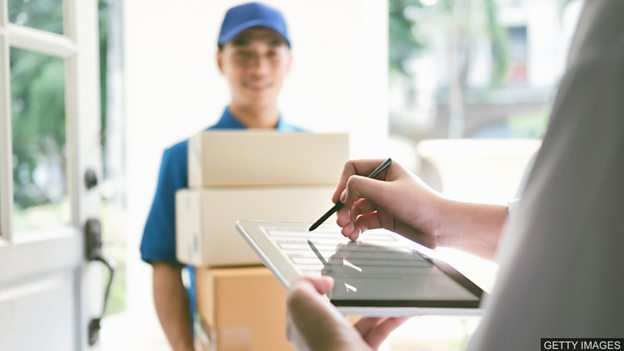随身英语
Serial returners 快购时代的 “连环退货买家”

在当今时代,时尚业竞争激烈,零售商们用各种方式让退货变得不再困难。大多数情况下,消费者们只需要把服饰带回服装店就可以了。这虽然让退换货物变得非常方便,却催生出了不少先大量购买商品,再退还回去的买家。这看似无伤大雅,但公司的利润却因此受到影响。面临这一趋势,很多公司却没有想出相应的对策。本集《随身英语》讨论 “连续退货族” 给卖家带来的影响,并介绍一些和购物有关的英语词汇。
Vocabulary: shopping 词汇: 购物
We've all done it. We buy something we think we like and then change our minds about it. Whether panic buying, an impulse purchase or shopper's remorse, we're fortunate many companies allow us to easily exchange or refund items. In fact it's so easy these days that retailers are seeing an increase in a new type of shopper: the serial returner.
A serial returner is someone who buys items, often in bulk, only to return most of them. 41-year-old Hester Grainger, founder of Mumala Club, estimates spending £300 to £400 each month on clothes, but returning "around 80%", she told the BBC. This isn't unique. Barclaycard, which processes nearly half of the UK's credit and debit card transactions, says that in the last two years 26% of retailers have seen an increase in in-store and online returns – with the number of items being sent back up by 22%.
It's a problem for companies. Handling these returns eats into profits. Free delivery for the customer means the company foots the bill. Items may need to be repackaged. They are damaged - making them unfit for resale. Tony Mannix, CEO of Clipper, a logistics firm that handles returned goods for major retailers, said about 5% of them end up "being binned." Sometimes the fast fashion cycle has moved on. By the time the item comes back, it becomes a cut-price item on a reduced-to-clear rail - at further loss to the company.
Some companies are taking action to deter this behaviour. According to a BBC article, four in ten retailers now say they charge for returns to discourage the sending of non-faulty items. Online retail giant Amazon was reported to have started barring customers with too many returned items. This is something a study by retail management system Brightpearl found over half of UK fashion retailers would consider. And Barclaycard says a third of retailers have hiked their prices to cover these returns.
But Vicky Brock, director of data innovation at ReBound Returns, a returns management software system, believes this isn't the best strategy. Speaking in a BBC article, she says discouraging returns shows a lack of understanding by the retailer. Using data, companies can reduce returns by helping customers choose better. Some companies such as Uniqlo and Asos already provide a suggested size based on the customer's previous purchases and information on height and weight. Ultimately, she says, returns are now as much a part of the shopping experience as buying things, and shops need to take this into consideration.
词汇表
panic buying (因害怕商品短缺的)恐慌性购物
impulse purchase 冲动消费
shopper's remorse 买了后悔的心态
exchange 换(货)
refund 退款
retailer 零售商
serial returner 连环退货的消费者
in bulk 大量、成批
transaction 交易
foot the bill 掏腰包
repackage 重新包装
logistics firm 物流公司
fast fashion (紧跟流行趋势、价格低廉的)快速时尚
cut-price 降价出售的
reduced-to-clear 清仓减价
rail 挂衣杆、架
charge 收费
returns 退货
hike (价格)大幅增加
suggested size 推荐尺寸
测验与练习
1. 阅读课文并回答问题。
1. True or false? Serial returners are on the rise.
2. Approximately what proportion of her clothes purchases does Hester Grainger return?
3. What actions are companies taking to stop serial returning?
4. What does discouraging returns reveal about a retailer, according to Vicky Brock?
5. Which word used in the article means 'thrown away'?
2. 请在不参考课文的情况下完成下列练习。选择一个意思合适的单词填入句子的空格处。
1. I don't know why I bought this chocolate. I'm not even hungry! It was an ______.
panic buy impulse purchase refund fast fashion
2. They were so cheap! I bought them in a ______ section of last season's clothes.
shopper's remorse suggested size exchange reduced-to-clear
3. With the hurricane approaching, people have started ______ water and food.
panic buying impulse purchasing serial returning in bulking
4. It was a bad date. She left without me early and I had to ______ for the meal!
feet the bill foot the bill eye the bill leg the bill
5. A bad potato harvest has led to retailers ______ the price of crisps as supplies grow scarce.
panic buying impulse purchasing hiking cutting the price
答案
1. 阅读课文并回答问题。
1. True or false? Serial returners are on the rise.
True. In the last two years 26% of retailers have seen an increase in in-store and online returns – with the number of items being sent back up by 22%.
2. Approximately what proportion of her clothes purchases does Hester Grainger return?
Hester returns around 80% of her clothes purchases.
3. What actions are companies taking to stop serial returning?
Some retailers charge for returns, some bar customers with too many returns and some retailers have hiked their prices.
4. What does discouraging returns reveal about a retailer, according to Vicky Brock?
She says discouraging returns shows a lack of understanding by the retailer.
5. Which word used in the article means 'thrown away'?
Binned. "Tony Mannix, CEO of Clipper, a logistics firm that handles returned goods for major retailers, said about 5% of them end up "being binned."
2. 请在不参考课文的情况下完成下列练习。选择一个意思合适的单词填入句子的空格处。
1. I don't know why I bought this chocolate. I'm not even hungry! It was an impulse purchase.
2. They were so cheap! I bought them in a reduced-to-clear section of last season's clothes.
3. With the hurricane approaching, people have started panic buying water and food.
4. It was a bad date. She left without me early and I had to foot the bill for the meal!
5. A bad potato harvest has led to retailers hiking the price of crisps as supplies grow scarce.



